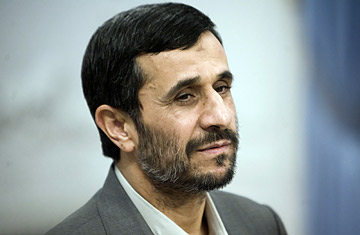
Iranian President Mahmoud Ahmadinejad
(2 of 2)
European diplomats played down Germany's absence from the stage and said the Germans may still be willing to back tough sanctions, having only learned the details of the new plant this week. "From the feedback we got from them, I think they will go along" with new sanctions, says a senior European diplomat. Russia and China are less likely to be impressed by the new information, says the diplomat, noting that they continue to have "different, conflicting views" from the Western powers about further sanctions. Medvedev said on Sept. 24 in Pittsburgh, "I do not believe sanctions are the best way to achieve results," but added that if incentives don't work, "we'll consider other options."
The absence of Germany, Russia and China from Friday's announcement was all the more disappointing given the fact that the U.S. has spent more than a year in careful deliberations aimed at securing a consensus among all six countries, whose representatives will meet with Iranian negotiators in Geneva next week. The U.S. strategy, devised and implemented by Obama's top Iran adviser, Dennis Ross, was to set up a clear choice for Iran: engage in broad talks without precondition aimed at bringing its nuclear program back into line with international agreements, or face the "crippling sanctions" of which U.S. Secretary of State Hillary Clinton warned last spring. Last spring, Ross and others had spoken of the G-20 meeting in Pittsburgh as the pivotal moment at which the Iranians would be confronted with a united international front demanding immediate compliance under threat of tough consequences.
Iran has proven adept over the years at dividing the international community, weakening the effects of past sanctions and buying time to advance its nuclear program, which by now has enough low-enriched uranium to enable it to produce sufficient highly enriched uranium for one nuclear weapon. It seems as if the Iranian leadership may have pulled the same trick again. Perhaps Merkel really did have a more pressing engagement — the German embassy did not immediately return calls requesting an explanation. But for all the positive spin U.S. officials had put on Russia's hints of greater willingness to support new sanctions, Medvedev's absence from the podium on Friday spoke far more loudly of the difficulty the U.S. faces in mustering a durable coalition for sanctions. Without Russia, it will be very difficult to build a united international front, even in light of Iran's new transgressions.
The original version of this article mistakenly identified Russian President Dmitri Medvedev as Prime Minister.
